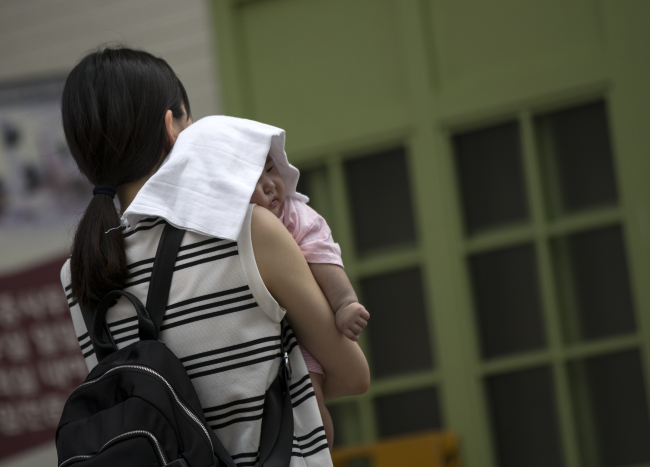The young woman labored up the steps, past brightly decorated walls akin to a child’s nursery, her daughter in her arms. Opening a hatch in the wall, she put her inside, turned around and walked away.
She ran her hands over her head but did not look back, surveillance camera footage showed. She may never see the girl again.
South Korea has risen from the ruins of war to become Asia’s fourth-largest economy and a member of the OECD club of developed countries.
It was for a time one of the world’s biggest sources of unwanted children, driven by poverty, a light regulatory touch, and a culture of racial purity, family bloodlines, and shame.

Around 110,000 South Koreans have been adopted to the United States alone since the 1950s but numbers have fallen in recent years.
Birth rates have plummeted to the world’s lowest with factors such as high child-rearing costs and a workaholic culture affecting the situation.
But the number of abandoned babies has jumped in recent years in the wake of a law intended to protect children.
Now more changes are mooted, for similarly well-intended reasons, that campaigners say could make the situation even worse.
Buried alive
The woman in the video footage was among the latest of more than 1,000 to have made their way to a house in a working-class neighborhood on the outskirts of Seoul.
Converted into a shelter by a small Seoul church, a temperature-controlled chamber built into the wall functions as a baby box, enabling unwanted newborns to be taken in without parents having to identify themselves.
New arrivals -- almost 200 last year, an average of nearly four a week -- are deposited covered in blood, wrapped in material, sometimes with the umbilical cord still attached.
Pastor Lee Jong-rak of the Jusarang Community Church set up the facility after hearing reports of babies being abandoned in the open air or in public restrooms, where they risked dying of hypothermia.
“Some teenagers give birth to babies in empty houses or in public toilets.
They wrap them in old shirts or towels and bring them to us,” he told AFP.
On one occasion, a young couple brought in a baby covered in dust. The father had been planning to bury it alive, he explained.
“When the father started shoveling earth over it, the mother could not bear it anymore and rescued the baby.”
Social stigma
In 2010, its first year of operations, just four babies were placed in the box.
At the time, South Korean women who wanted to give up unwanted babies were obliged to give adoption agencies their written consent, but often gave false details or no records, and operators looked the other way.
But two years later the country adopted a law banning adoption agencies accepting undocumented babies, in line with the Hague Convention, which aims to give adoptive children the right to trace their birth parents. It also required all adoptions to be court-approved.
In 2013, 224 babies were abandoned at the centre by parents desperate to hide their identities.
Almost all who do so are poor single women. More unmarried mothers are keeping their children in South Korea, but face social ostracism and struggle to find husbands willing to accept such a past.
Even employment checks often go into family background, and would show that a woman had had a child and given it up.
The box operates in a legal grey area.
Authorities are fully aware of it, and the welfare ministry -- which has a specific category for it in its statistics -- neither supports it nor opposes it as, according to official Kim Hye-ji, “it saves the lives of newborn babies”.
But the Gwanak district office has repeatedly urged Pastor Cho to shut it down. “We see the baby box as an illegal facility that encourages baby abandonment,” said local official Min Seo-Young.
Blank sheet
The shelter looks after new arrivals for a few days until they are moved to orphanages to await new families.
But a stigma remains around adoption in Korea, where a focus on preserving family bloodlines makes the idea of raising someone else’s child anathema to many.
It also has a long history of taking pride in its racial homogeneity -- many of the first international adoptees were the mixed-race children of American servicemen and Korean mothers.
International adoptions slumped by three-quarters in the wake of the 2012 law -- which tightened requirements from natural and prospective adoptive parents -- going from 916 the previous year to 236 in 2013.
Now Seoul says it aims to ratify the Hague Convention, which says children should preferably be adopted by families in their home country, by the end of the year.
Officials say that will see authorities regulate all stages of the adoption process, including the reasons children are given up, the qualifications of adopting parents, and ensuring that as adults, adoptees will be able to trace their birth families.
Pastor Lee’s colleague Cho Tae-seung is concerned that the regulations resulting from the convention could backfire by driving women to abandon unwanted babies illicitly and dangerously.
“It’s very hard to strike a balance between reality and international adoption norms,” he said.
Instead the group wants mothers to be legally allowed to give birth and give up their children anonymously.
Next to the hatch in the wall, a form enables parents to state a child’s name, date of birth, and vaccinations.
The mother in the video left it blank. (AFP)
-
Articles by AFP





![[K-pop’s dilemma] Can K-pop break free from ‘fandom’ model?](http://res.heraldm.com/phpwas/restmb_idxmake.php?idx=644&simg=/content/image/2024/05/09/20240509050541_0.jpg&u=20240509173751)




![[News Analysis] Yoon's first 2 years marked by intense confrontations, lack of leadership](http://res.heraldm.com/phpwas/restmb_idxmake.php?idx=644&simg=/content/image/2024/05/09/20240509050612_0.jpg&u=20240509233252)








![[Today’s K-pop] NCT’s Mark to drop 1st solo album in February 2025](http://res.heraldm.com/phpwas/restmb_idxmake.php?idx=642&simg=/content/image/2024/05/10/20240510050597_0.jpg&u=)